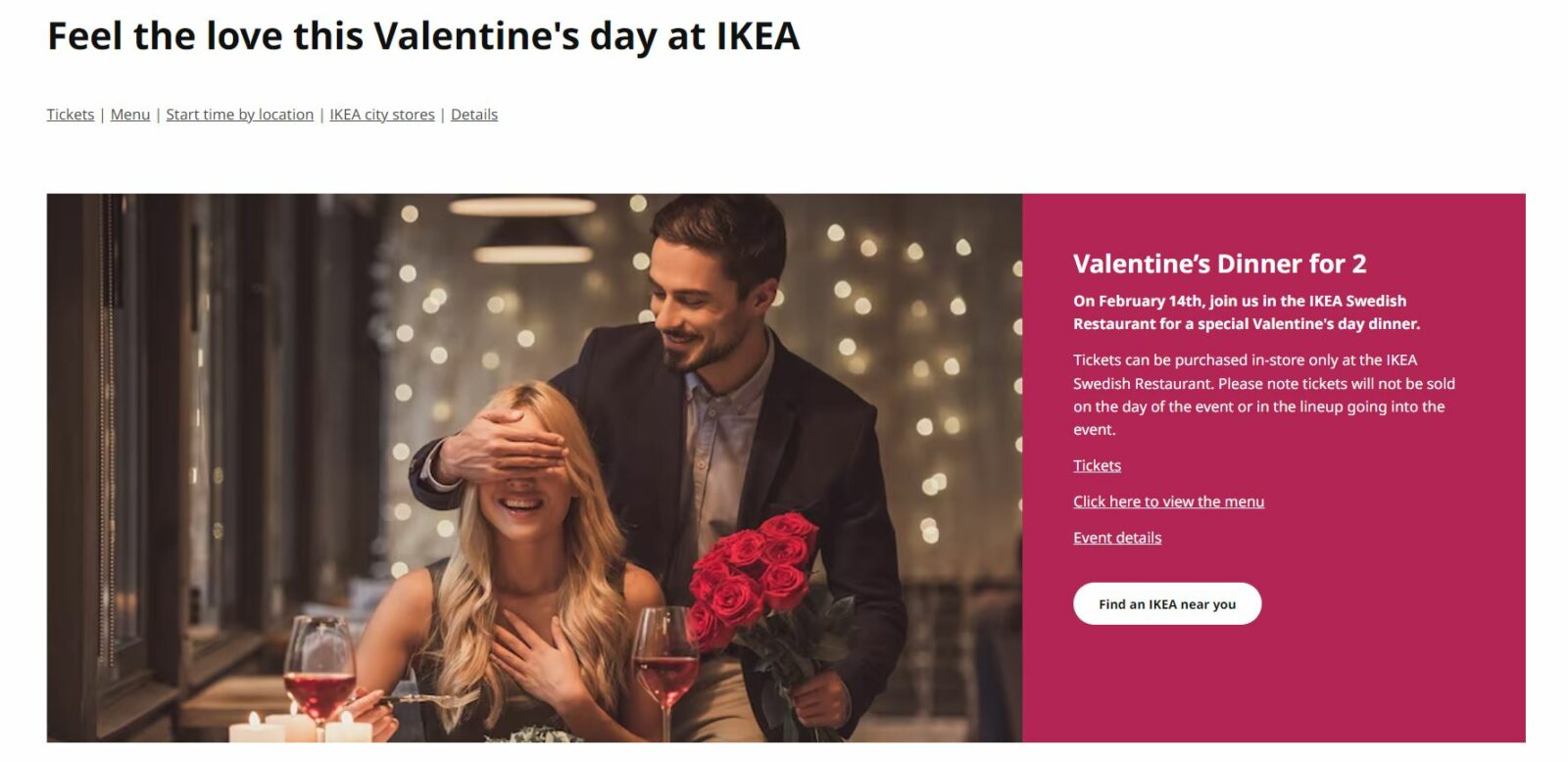Valentine’s Day, which traditionally celebrates romantic love, stands as a cultural hallmark that celebrates romantic love in its most traditional sense. Historically, businesses seize the day to target couples with promotions and products. Yet, as societal norms evolve and the number of single adults rise globally, there is an opportunity to reimagine Valentine’s Day. Expanding the definition of “love” could acknowledge the growing demographic of singles who, either by choice or circumstance, find themselves outside the conventional bounds of romantic partnerships.
And that would be good for business.
A recent promotion by IKEA Canada exemplifies a conventional approach, offering a special Valentine’s Day Dinner exclusively for couples.
On February 14, IKEA’s Toronto locations will offer a special three-course dinner in their food hall. The menu starts with a choice of Tomato Feta Soup, Hungarian Mushroom Soup, Caesar Salad, or House Salad. Main course options include Sun-Dried Tomato Pesto Veggie Balls, Mediterranean Salmon, or the classic Swedish Meatballs. Dessert features Cheesecake, Chocolate Cake, or Daim Cake.
The dining experience, priced at $35.99 for two adults (and only two adults) and $5.99 for children, invites guests to enjoy a “romantic” meal amid the setting of IKEA’s iconic furniture.
This initiative, while kitschy and fun, obviously overlooks a significant demographic: single individuals (and polyamorous folks with more than two partners).
Yet the current landscape presents an undeniable reality: half the US adult population is single, and half of them are not pursuing romantic relationships, preferring to focus on other aspects of personal fulfillment and happiness–a trend also seen in Canada.
Singles also buy a lot of IKEA furniture.
IKEA’s decision to host a couples-only Valentine’s Day dinner is a missed opportunity. The decision likely stems from an oversight, not intentional exclusion. n. It was likely made by employees who are married themselves and unaware of the dramatic demographic shift.
I suggest businesses broaden Valentine’s Day to celebrate all forms of love, including self-love, friendship, and community, thereby reflecting the many ways in which love manifests in modern society.
IKEA’s missed opportunity serves as a valuable lesson. An inclusive Valentine’s Day promotion would not only enhance their brand image but also set a precedent for how companies can cater to all customers, irrespective of their relationship status. While the romantic Valentine’s Day dinner may particularly appeal to couples, IKEA could easily make it inclusive to singles as well. Simple tweaks like selling individual tickets and referring to “guests” rather than couples in the promotion’s language could go a long way. They may also consider offering pricing or incentives to those attending solo.
Suggestions for business more generally:
- Host Singles Appreciation Events: Businesses could host events that celebrate the single lifestyle, offering a mix of entertainment, socializing opportunities, and special offers that highlight self-love and individual empowerment.
- Create Customizable Package Deals: Offer customizable package deals for one, two, or more, allowing customers to tailor their Valentine’s Day experience according to their relationship status or social group size, embracing not just singles but also friends, families, and non-traditional relationship structures.
- Promote Self-Care Products and Services: Shift some marketing focus towards self-care products and services, such as spa treatments, personal development workshops, or luxury solo travel packages, highlighting the importance of self-love and personal fulfillment.
- Introduce ‘Bring a Friend’ Discounts: Encourage people to celebrate Valentine’s Day with friends or family by offering ‘bring a friend’ discounts. This approach can make the day more inclusive, allowing everyone to partake in the celebrations, regardless of their romantic status.
- Leverage Social Media for Broader Engagement: Utilize social media campaigns to engage singles, asking them to share stories or photos of how they celebrate self-love or friendships on Valentine’s Day.
- Offer Gift Guides for Self-Gifting: Publish gift guides focused on self-gifting, suggesting items that individuals might enjoy buying for themselves. This can help normalize the idea of treating oneself on Valentine’s Day.
- Organize Community Service Events: Promote the spirit of love by organizing community service or charity events, inviting singles to give back to the community. This approach channels the day’s focus away from romantic love towards love in action, fostering a sense of community and purpose.
- Feature Stories of Different Love Forms: Highlight stories of friendship, family love, and self-love in marketing materials to show that Valentine’s Day isn’t only for romantic couples. This can help singles feel seen and valued by brands.
- Incentivize Solo Diners or Shoppers: Offer special incentives, like a free dessert or a small gift, to individuals dining or shopping alone on Valentine’s Day. This small gesture can make singles feel welcomed and appreciated.
What would you add to the list?
Dr. Peter McGraw—a behavioral economist, business school professor and bachelor—hosts the podcast Solo—The Single Person’s Guide to a Remarkable Life. As the Director of The Humor Research Lab (HuRL) and author of Solo, The Humor Code, and Shtick to Business), McGraw speaks at Fortune 500 companies, public events, and universities around the world.


